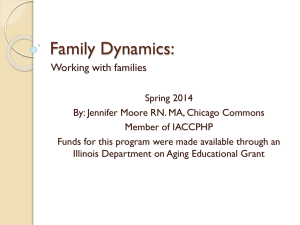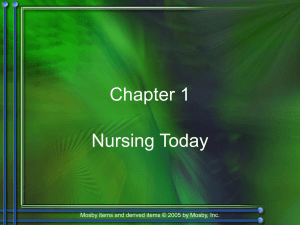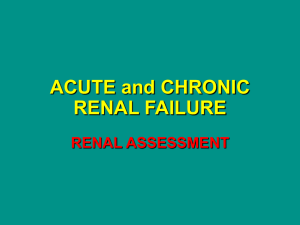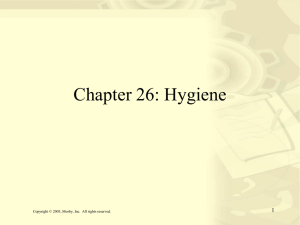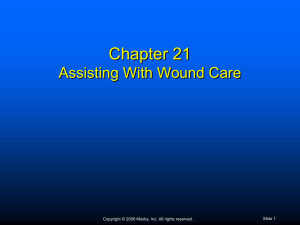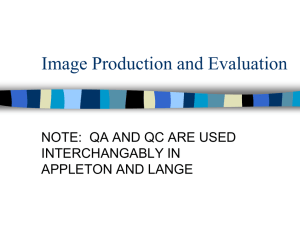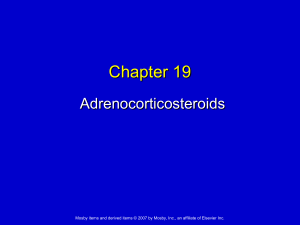11 - Family-Focused Med
advertisement
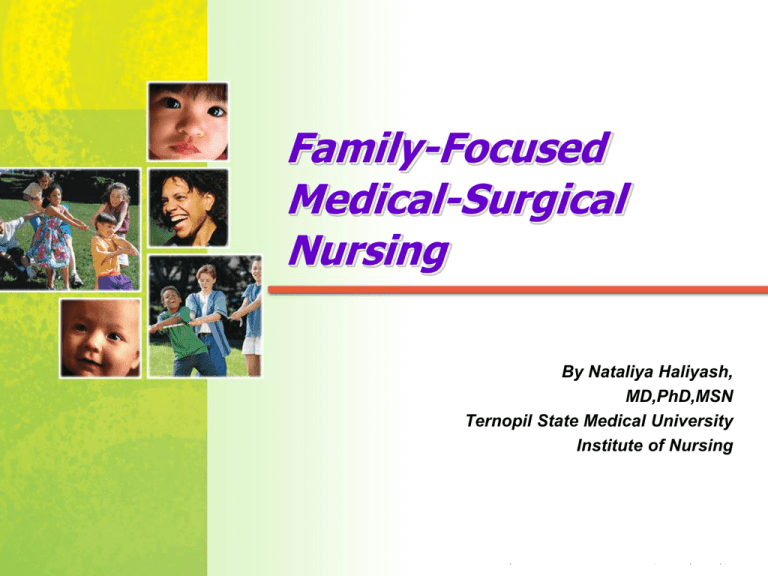
Family-Focused Medical-Surgical Nursing By Nataliya Haliyash, MD,PhD,MSN Ternopil State Medical University Institute of Nursing Mosby items and derived items © 2005, 2001 by Mosby, Inc. • Family members who receive care in medical-surgical settings are more likely to be empowered to deal with the stressors of foreign hospital environments and thus better prepared to provide support to patients and aid in their recovery or facilitate a comfortable death. Mosby items and derived items © 2005, 2001 by Mosby, Inc. Lecture objectives After the lecture you’ll be able to: • Discuss several theoretical frameworks for nursing of families. • Assess the impact of illness on families • Foster the positive relationships with families at different stages of illness • Recognize the family needs in acute care • Cope with patients at the end of life and meet their family needs • Prepare for patient discharge Mosby items and derived items © 2005, 2001 by Mosby, Inc. Impact of patient hospitalization on families • Stressful factors: – foreign hospital environments – nurses and doctors as strangers who speak another language – separation anxiety – emotions of family members such as fear, anger, and guilt Mosby items and derived items © 2005, 2001 by Mosby, Inc. Mosby items and derived items © 2005, 2001 by Mosby, Inc. Theoretical frameworks for nursing of families • Social-science theories: – structural-functional theory, – family systems theory, – family stress theory, – and family resilience theory • are concise and easy to use and do not depend on long-term relationships with families. Mosby items and derived items © 2005, 2001 by Mosby, Inc. Family stress theory Mosby items and derived items © 2005, 2001 by Mosby, Inc. The Model of Family Stress Mosby items and derived items © 2005, 2001 by Mosby, Inc. The family resilience theory Mosby items and derived items © 2005, 2001 by Mosby, Inc. Therapeutic Quadrangle the illness the family the health care team the patient (Rolland, 1988). Mosby items and derived items © 2005, 2001 by Mosby, Inc. Mosby items and derived items © 2005, 2001 by Mosby, Inc. Therapeutic Quadrangle Illness • variability of characteristics: – onset (sudden, gradual, etc) – course of the disease may be progressive, constant, or relapsing – incapacitation from impairment of cognition, sensation, movement, or energy production – complexity, frequency, and efficiency of treatment; – amount of home care and hospital-based care required Mosby items and derived items © 2005, 2001 by Mosby, Inc. Chronic illness management Mosby items and derived items © 2005, 2001 by Mosby, Inc. Therapeutic Quadrangle Family • family flexibility, • family’s previous experience with illness or injury, • the availability of resources to deal with the event, • problem-solving ability, • coping skills, • and family perceptions.. Mosby items and derived items © 2005, 2001 by Mosby, Inc. Therapeutic Quadrangle Health care team characteristics • priority team members assign to family care, • their sensitivity to family needs, • and their knowledge and ability to assess and intervene with families. Mosby items and derived items © 2005, 2001 by Mosby, Inc. Therapeutic Quadrangle Patient’s characteristics that affect family adjustment • The identity of the sick person (e.g., mother, father, grandmother, spouse, sister), • the way the patient handles illness, • the point in the individual’s life span at which the illness occurs. Mosby items and derived items © 2005, 2001 by Mosby, Inc. FAMILY MEDICAL-SURGICAL NURSING AT VARIOUS PHASES OF ILLNESS • Demonstrate commitment — Respond to family members as persons, spend time with the family, anticipate family needs • Persevere — Get to know a lot about the family, spend time with more difficult families • Be involved — Advocate for the family, bend or break rules when possible Mosby items and derived items © 2005, 2001 by Mosby, Inc. Five tasks that families must accomplish during the crisis phase of illness (1) creating a meaning for the illness event that preserves a sense of mastery over their lives (2) grieving for the loss of the family identity before illness (4) pulling together to undergo short-term crisis reorganization (3) moving toward a position of accepting permanent change while maintaining a sense of continuity between the past and the future (5) developing family flexibility about future goals Mosby items and derived items © 2005, 2001 by Mosby, Inc. Family Needs in Acute Care Assurance Proximity Comfort Informa -tion Support Mosby items and derived items © 2005, 2001 by Mosby, Inc. Family Need for Visitation during Hospitalization Factors that should be considered when planning visiting periods with families: • age, • patients’ personality characteristics, • patients’ perceptions of the illness, Surprisingly, the more severely ill patients perceived themselves to be, the more visitors they preferred. Mosby items and derived items © 2005, 2001 by Mosby, Inc. Family Need for Visitation Mosby items and derived items © 2005, 2001 by Mosby, Inc. Family Need for Visitation Mosby items and derived items © 2005, 2001 by Mosby, Inc. To tailor visiting policies One way to do this is to ascertain the answers to questions such as: • How would you like visiting times to be handled while you are here? • Who would you like to be allowed/disallowed to visit? • When do you want to see visitors? How often? For how long? Mosby items and derived items © 2005, 2001 by Mosby, Inc. To tailor visiting policies Mosby items and derived items © 2005, 2001 by Mosby, Inc. To tailor visiting policies Mosby items and derived items © 2005, 2001 by Mosby, Inc. End-of-Life Care Middle phase: Life with the dayto-day challenge of dealing with physical symptoms, treatment, and care 3rd phase Preparatory phase: From the first symptoms till the initial diagnosis 2nd phase 1st phase • Phases of Family Adaptation The final stage: acceptance arrives when the family accepts the imminent death and concludes the process of saying farewell. Mosby items and derived items © 2005, 2001 by Mosby, Inc. Grieving family Mosby items and derived items © 2005, 2001 by Mosby, Inc. Mosby items and derived items © 2005, 2001 by Mosby, Inc. Meeting Family Needs Before Death 1. To be with the dying person and to provide help to the dying person 2. To be informed of the dying person’s changing condition and to understand what is being done to the patient and why 3. To be assured of the patient’s comfort and to be comforted 4. To ventilate emotions and to be assured that their decisions were right 5. To find meaning in the dying of their loved one 6. To be fed, hydrated, and rested (Truog et al., 2001) Mosby items and derived items © 2005, 2001 by Mosby, Inc. Thanks for attention! Mosby items and derived items © 2005, 2001 by Mosby, Inc.
